Three years and hundreds of thousands of casualties into Russia‘s full-scale invasion, Ukraine’s war-weary population still sees no end in sight.
With Kyiv desperate for manpower and violent press-gangers roaming the streets, many fighting-age men are willing to do almost anything to dodge the draft.
They fake diseases they don’t have, bribe doctors for medical exemptions and even marry disabled women to secure a coveted carer’s permit, all in hopes of stopping conscription officers from darkening their doors.
Some go further still, slipping across rivers in dinghies and sneaking through forests to cross borders, only to wind up in Western Europe living off benefits meant for genuine refugees.
MailOnline spoke to several Ukrainian men who openly confessed how, and why, they’ve managed to avoid being called up to serve – men who, by their own admission, might well have fought and died on the front lines by now had they not done so.
We also spoke to a lawyer building a new career as an ‘anti-draft adviser’, schooling clients on the myriad ways they can beat the military recruiters without stepping outside the confines of the law.

For Ukraine, which had considerably less than a third of the population of its adversary even before the February 2022 invasion triggered a mass exodus, remaining a viable opponent to Russia’s huge army meant enforcing conscription


A Ukrainian man is pictured being dragged into a vehicle by military recruitment officers

A fraudulent ID card claiming disability is one way to avoid conscription
The matchmaker and fraudster
Levko, 41, is the proud owner of an ID card which shows he is disabled – only it’s not his.
He claims to have found it in 2023 at a second-hand market and bought it for a few hundred hryvnia, less than five pounds.
The original owner, whose portrait is on the card, bears little resemblance to Levko.
But with a bit of effort that includes regularly dyeing his hair, he says that the permit is enough to fool conscription officers, and grants him a medical exemption from military service.
Levko lives each day in fear that one day, the conscription office will dig through their records and realise his fraud. If that happens, he will not only be shipped off to war, but will be slapped with a hefty fine – another fate he is keen to avoid.
The 41-year-old, who works as a matchmaker, owns a marriage agency and enjoyed tidy profits before the war, arranging dates and marriages between Western men and Ukrainian women.
But Russia’s invasion has greatly hampered his business, not least because many women fled the country.
‘I hate the Ukrainian government,’ he said flatly. ‘My ex-girl is now in Britain. I hate all the girls who went abroad.
‘I’ll join (the military) when they make women join… since they are more patriotic than men,’ he quipped sarcastically.
Besides his distaste for Zelensky’s government, Levko wanted to avoid military service after hearing stories from friends who had been sent to fight.
‘I know some people who have died in the military training,’ he claims. ‘One had epilepsy, but nobody knew how to care for him, so he was left to die.’
He added that many prospective conscripts fear the treatment from their own military almost as much as the enemy.

Levko, 41, owns a marriage agency. He enjoyed tidy profits before the war, arranging dates and marriages between Western men and Ukrainian women

A man is dragged off the street by heavily armed soldiers roaming the streets of Odessa to press gang civilians into the military
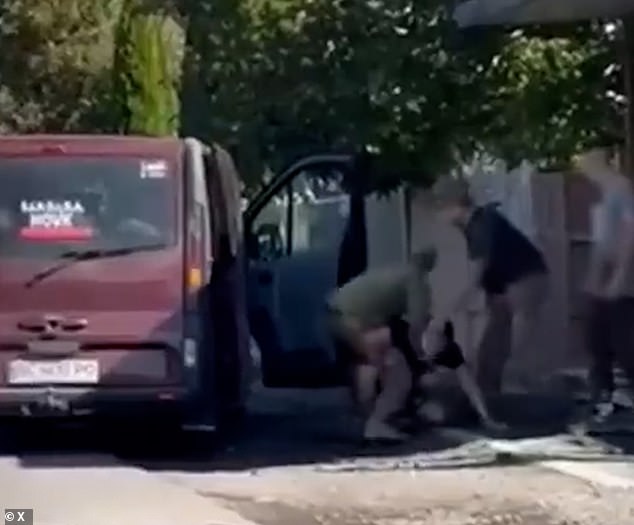
A band of press-gangers are seen wrestling a man and trying to force him into a van

A distraught man appears to plead with conscription officers as they surround him in Kyiv
The ‘carer’
Watching a relative endure disease, illness, or old age can be a trying ordeal. But for Ukrainian fighting-age men, it is also a blessing.
Artem*, 48, is unemployed, but looks after his elderly mother at home in Kyiv. As a registered carer for his 85-year-old parent, he is exempt from service.
Every few months, officials drop by to verify that he still lives with her, and a yearly trip to the hospital confirms that the old woman needs care.
But when Russian helicopters soared over Ukrainian skies and tanks rolled across the border some 40 months ago, Artem was not sitting at his infirm mother’s bedside – his brother was responsible for caring for the matriarch, meaning Artem himself was in line to be drafted.
So, the family hatched a cunning plan to safeguard the fate of both sons.
Fighting-age males were restricted from leaving the country, but as a registered carer, Artem’s brother was briefly permitted to accompany his mother abroad.
‘My brother’s family were in Poland, and he travelled there with my mother,’ Artem explained. ‘The next day, my mother left him in Poland and travelled back to Ukraine alone.’
As soon as she stepped foot back on Ukrainian soil, Artem collected her, drove to Kyiv and immediately registered himself as her responsible carer, thus exempting him from being called up.
Artem said that fears for his personal safety and his poor physical condition were paramount to his decision to avoid the draft. ‘I have some problems with my back and so on, but I could serve. Now I’m safe.’
Although his method for avoiding the draft is technically legal, he made it clear that many go to great lengths to obtain a golden ‘carer’ permit – and said he is all too happy to help them.
‘You can do anything to get a deferment… find a disabled woman, psychologically problematic, get married and you’re her carer,’ he laughed.
‘I am also trying to help those who don’t know the legal processes or how to deal with the police. When they approach me, I ask them to give me their name and ID card number, which they are obliged to do under Article 32 (of the Ukrainian Law on National Police).
‘If not, police can misinform you, lie to you about your rights.’
Weeks after speaking with MailOnline, Artem was arrested by conscription officers and sent to military training despite his status as a carer. His associates plan to lodge a legal challenge, but we no longer know where Artem is.
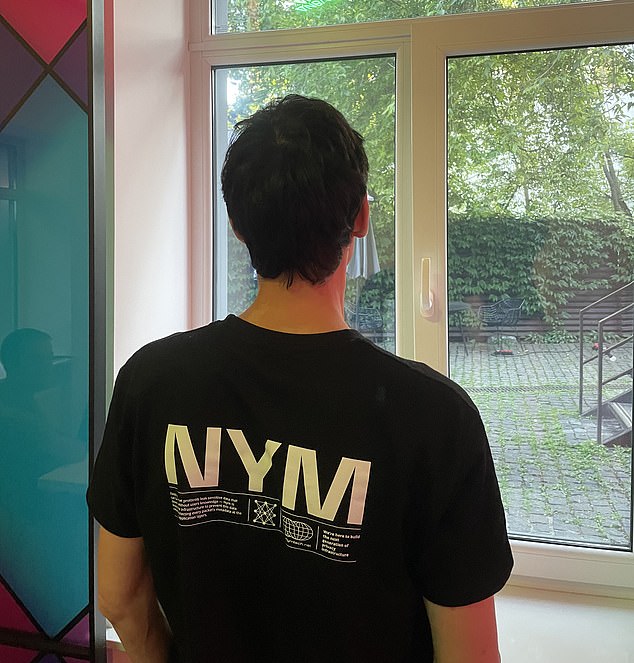
Artem*, 48, managed to avoid conscription by obtaining a carer permit in the course of looking after his elderly mother. But he was recently detained and MailOnline has since lost contact with him
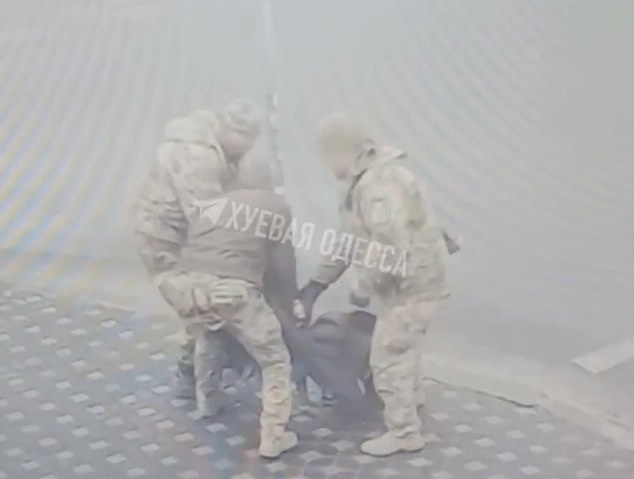
CCTV footage shows Ukrainian soldiers detaining a man to be conscripted
The crypto king who bribed a doctor
Bohdan, 29, earns a living from cryptocurrency, which he says brings in the profits to afford the oldest and trustiest trick in the book – bribery.
The crypto trader was able to pay a doctor a healthy fee to make out papers that allowed him to obtain a medical exemption card.
In a country where the average monthly salary sits at roughly £423 per month, this is not an option available to most men.
Bohdan declined to state the exact amount he paid, but was happy to provide some ballpark figures for the practice, which he believes is rife.
‘Bribing a doctor can cost anywhere from $5000 to $15,000 and more, depending on the doctor’ he said through a translator.
Doctors in Ukraine are unlikely to be drafted, but they are still forced to register with the military and are by no means exempt from mobilisation.
By dabbling in corruption and handing out papers which claim an individual is medically unfit to fight, a doctor can more than double their salary at a relatively low level of risk, Bohdan said – potentially granting him the means to dodge conscription himself.
‘The doctor, he too is looking for a job which will allow him to defer or avoid the draft.’
The journalist turned teacher
Andriy, 38, was previously a journalist but at the outbreak of war quickly switched careers and now works as a mathematics teacher.
Teachers at schools and universities are included in the list of occupations that are partially exempt from the draft.
Other key industries whose employees are ‘booked’, meaning non-liable to serve, include the railways, energy sector, civil service and firefighters.
For schoolteachers, a one-year deferral from mobilisation is easy to attain, but they are not guaranteed permanent exemption from service. Becoming a teacher, however, remains one of the most popular methods for men looking to legally avoid conscription.
Andriy said that a violent run-in with a conscription officer encouraged him not to take any risks.
‘They smashed my phone when I tried to record and called me rude names,’ he said.
This reflects a common mood amongst those avoiding military service – often they are supportive of the cause yet dislike the conscription officers and police.
‘Often I make videos of the police when they do document checks – often the police aren’t checking the documents properly, they can just seize you.’
But the guilt of not serving has driven Andriy to support Ukraine’s efforts elsewhere.
‘It is morally difficult […] from the first days of the war, I helped the armed forces of Ukraine. I travelled to the newly liberated territories, bringing humanitarian aid to people.’

Andriy, 38, was previously a journalist but at the outbreak of war quickly switched careers and now works as a mathematics teacher
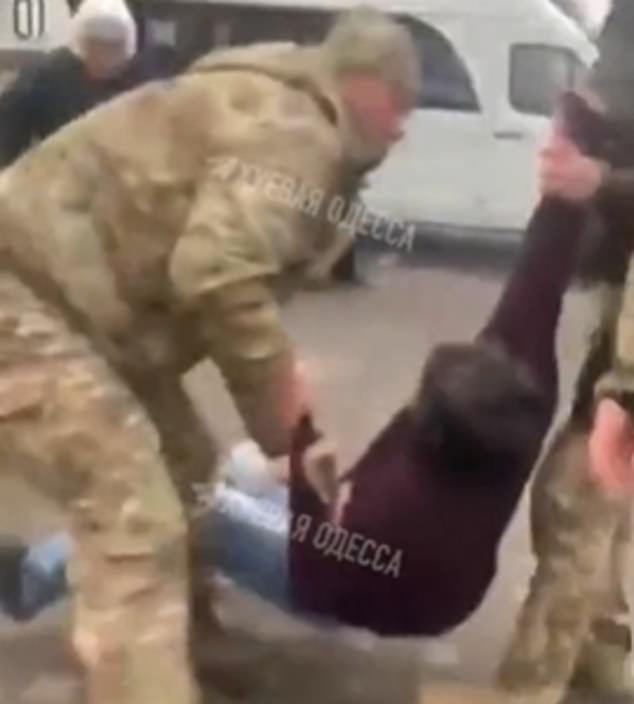
A man is dragged into a van by press gangers in Odessa
The ‘deserter’
Ihor, 35, was not content with any of the aforementioned approaches to avoid the military call-up.
Instead, he resorted to the most secure option, but one that comes with the greatest risk – fleeing the country altogether.
He explained how he left his home to track west, crossing the Dniester river in a rubber dinghy before slipping across the border into Moldova.
Ihor refused to give specifics of his journey, only to say that he eventually managed to reach Ireland.
He now claims to be living off benefit payments in state-supported accommodation, though it is unclear how long he will manage to continue doing so as the Irish government declared it was shuttering some housing facilities over the summer.
When asked to explain his reasons for leaving, he became jittery and refused to give details answers.
‘War makes you weird psychologically, I would like to be normal,’ he said, adding that he did not want ‘to fight for oligarchs and US money’.
When we pressed further, he refused to speak, declaring that journalists should ‘focus on Zelensky and reasons for the war’ and rolled back his earlier claims.
‘I am here legally because I came here on a deferment from the military,’ he said.
Under the EU-wide Temporary Protection Status, all Ukrainians who have left the country have a right to housing support, work, healthcare and social benefits.
But individual countries’ support for Ukrainian refugees varies, with Poland no longer providing welfare to men of fighting age.
‘There should be no financial incentives for avoiding the draft in Ukraine,’ Polish Foreign Minister Radoslaw Sikorski urged last year.
In April 2024, Ukraine also stopped offering consular support to fighting age men.
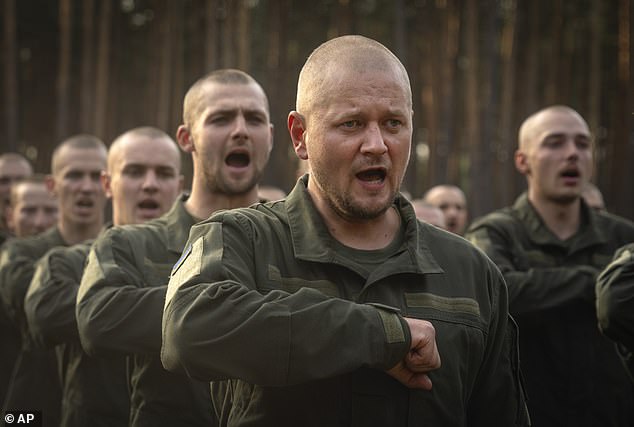
Newly recruited soldiers toss their hats as they celebrate the end of their training at a military base close to Kyiv
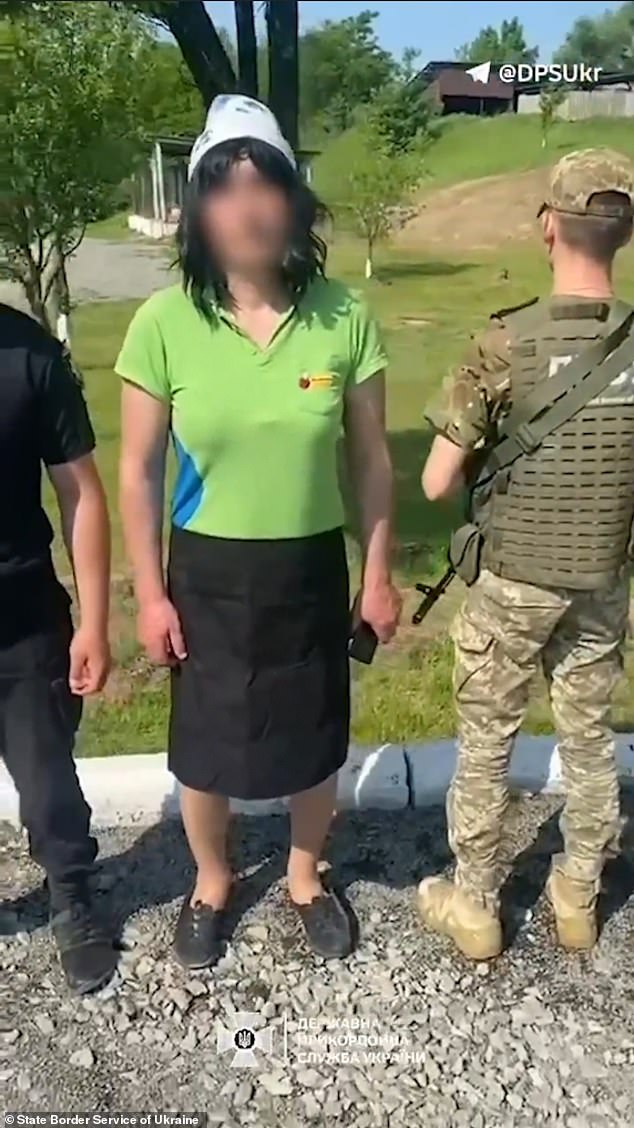
The man who dressed as a woman in an attempt to flee the country is detained by armed officers
The ‘anti-draft’ lawyer
Vadym Sydorenko is a lawyer who specialises in conscription law.
He told MailOnline that there are many ways that fighting age males can obtain legal exemptions from the draft. He also argued that it is in Ukraine’s interests that they do so.
‘The main profile of my clients is small and medium-sized business owners,’ Vadym said, explaining that he helps them in ‘obtaining the status of a critical business, allowing them to book employees’.
‘The state is interested in ensuring that critical companies continue to operate… electricity generation and utility workers, prosthetics, teachers, lecturers, for example.
‘The list of businesses and trades considered vital for society to continue functioning is quite large,’ he said.
However, the army is desperate to swell its ranks and recruitment officers often clash with business owners as they compete for manpower.
Vadym recalled one such case in which the armed forces blocked the transfer of a protected worker to a company and subsequently sent him to the front lines.
‘The company planned to ‘book’ this employee in October, but he was mobilised on September 10.
‘On September 11, the company promptly applied for a reservation and within one hour the employee was formally ‘booked’. However, the military unit refused to release the employee.
‘Since he was given military status the day before, the position of the military unit was found to be legal.’
At present, Ukraine’s young men remain exempt from such horrors.
Conscription law dictates that males aged 25-60 are eligible for mobilisation, after Volodymyr Zelensky revised the lower age limit of 27 down by two years in April 2024.
Zelensky has thus far resisted calls from the US to lower the draft age from 25 to 18, arguing that such a move would damage the country’s long-term future.
His argument was strengthened by a recent statement from Ukraine’s Ministry of Economy claiming the nation has lost 40% of its working-age population versus prewar figures.
But the government in February introduced ‘Contract 18-24’ – a scheme that encourages young men to voluntarily join the Armed Forces on a one-year contract.
In return, volunteers are awarded a package that includes a stipend of 1 million hryvnia (£17,467), an additional monthly salary of 120,000 hryvnia (£2,096), free healthcare, state-subsidised study opportunities, zero-per-cent mortgage options and the option to delay future mobilisation by up to one year.
Yet, as conscription lawyer Vadym points out, ‘there are some difficulties in extending the deferral for a second year.’
*Names have been changed where requested to protect the identity of sources.












